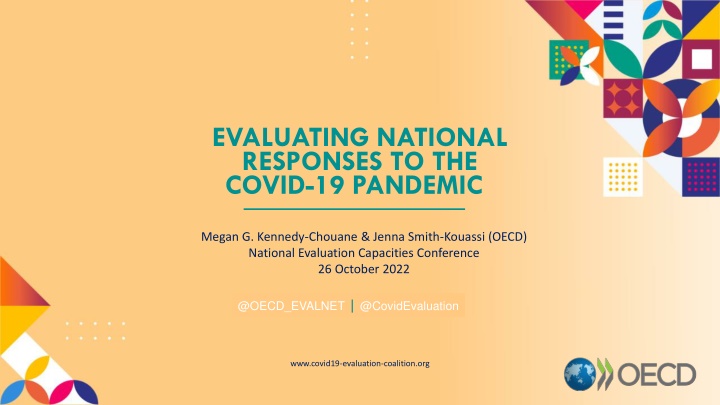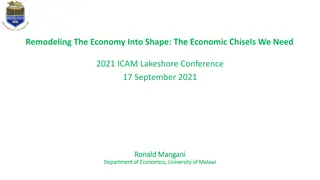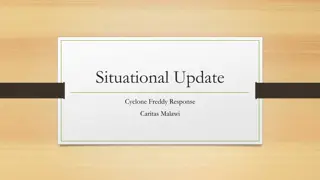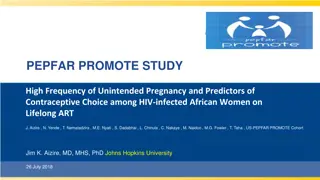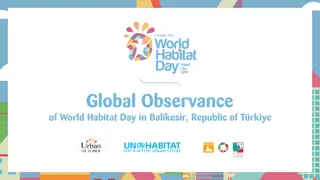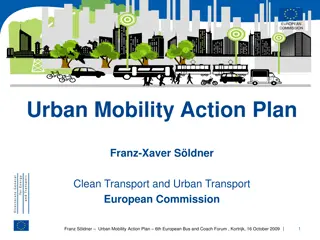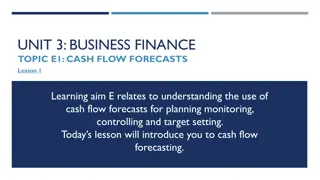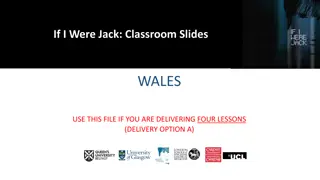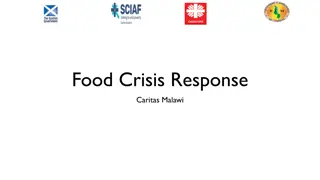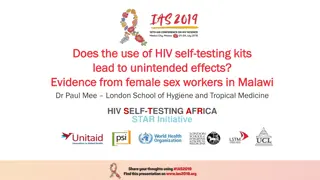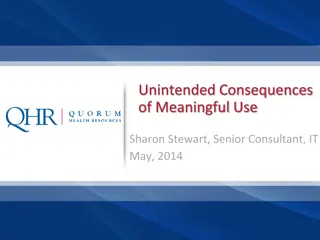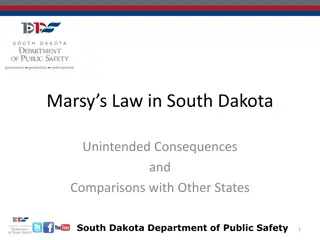Evaluation of Malawi's COVID-19 Urban Cash Intervention: Unintended Consequences
Malawi implemented the COVID-19 Urban Cash Intervention (CUCI) to assist urban poor populations during the pandemic. Evaluations focused on efficiency, impact on food security, and unintended consequences. The CUCI targeted 35% of the urban population, providing financial assistance for three months through collaboration with various stakeholders.
Download Presentation

Please find below an Image/Link to download the presentation.
The content on the website is provided AS IS for your information and personal use only. It may not be sold, licensed, or shared on other websites without obtaining consent from the author.If you encounter any issues during the download, it is possible that the publisher has removed the file from their server.
You are allowed to download the files provided on this website for personal or commercial use, subject to the condition that they are used lawfully. All files are the property of their respective owners.
The content on the website is provided AS IS for your information and personal use only. It may not be sold, licensed, or shared on other websites without obtaining consent from the author.
E N D
Presentation Transcript
EVALUATING NATIONAL RESPONSES TO THE COVID-19 PANDEMIC Megan G. Kennedy-Chouane & Jenna Smith-Kouassi (OECD) National Evaluation Capacities Conference 26 October 2022 @OECD_EVALNET|@CovidEvaluation www.covid19-evaluation-coalition.org
COVID-19 Country Led Evaluations Unintended consequences of COVID-19 mitigation: Evidence from Malawi s COVID-19 Urban Cash Intervention (CUCI) Sophie Kang oma October 2022 Director of Monitoring & Evaluation Ministry of Finance & Economic Affairs
Ministry of Finance and Economic Affairs M&E division Mandate: Monitor and evaluate public policies, projects and programmes implemented at all levels in collaboration with all sectors to promote results-based management and accountability. Functions: Coordinating monitoring of the implementation of government programmes, projects, policies and strategic plans at all levels Managing implementation of Government-wide Monitoring and Evaluation System; Conducting Evaluations of public policies, projects and programmes Facilitating community-based monitoring and evaluation Conducting Public Expenditure Tracking Survey and budget analysis Assessing food security and vulnerability for humanitarian response planning, and resilience building Facilitating capacity building
COVID-19 in Malawi The impact COVID had on Malawi Urban population? Fatality of active labor force: family breadwinners Loss of livelihoods and reduced income sources Increased unemployment in the urban settings (companies were scaling down or shutting offices) Health seeking behavior Disrupted social life
Malawis COVID-19 Urban Cash Intervention Intervention: The CUCI was initiated to help mitigate the adverse health and economic effects of COVID-19 on urban poor populations in Lilongwe, Blantyre, Zomba and Mzuzu. The CUCI targeted 35 Percent of Malawi s Urban population, with a disbursement of MK 35,000 (equivalent to 42.72 US$) per month, for three months. Key Stakeholders: The design and implementation of CUCI was led by the government of Malawi with the support of development partners including the World Bank, KFW, EU, GIZ, UNICEF, WFP, and ILO.
Malawis COVID-19 Urban Cash Intervention Evaluations Evaluations, already done, on CUCI: Process evaluation: the efficiency and effectiveness of implementation. Impact evaluation: the effects of CUCI on food security of beneficiaries. The current evaluation: Main objective : to understand the unintended consequences of the CUCI.
Evaluating unintended consequences of cash transfers Why should we care about unintended consequences? Because they may complement or off-set the main program benefits. Such evaluations, therefore, provide a more balanced picture of impacts Specific objectives: To establish the effects of CUCI on beneficiary domestic violence To establish the effects of CUCI on beneficiary labour supply To establish the effects of CUCI on non-beneficiary food insecurity Methodology A hybrid approach : Quantitative (household survey) & qualitative (cases studies)
National Response to COVID-19 how this evaluation contributes to a national evaluation demand? First time social protection targeted the urban poor: a learning curve for urban vulnerabilities. 1. Unintended outcomes and their mitigation 2. Added focus on non-beneficiaries (spillovers) Inform the design and implementation of cash transfer programs in Malawi. 1. Malawi s Social Economic Recovery Plan 2. Affordable Inputs Program 3. Expanded social cash transfers Guide both national and international stakeholders on future investments of cash transfers.
How this collaborative initiative benefits the national M&E system Building government capacity Evaluation is led by govt officers, technical support from GEC & GEI Lessons for future global crises Whether to include multisectoral approaches to future evaluations International learning Cross-country peer learning on crisis evaluations and best practices Spillovers to non-crisis evaluations Evolution of practices, even for the normal times M&E assessments
Thank you Thank you .
The Ghana CARES Obaatanpa Programme: Evaluating COVID-19 Response and Recovery 7/22/2024 11
National Development Planning Commission(NDPC) The M&E division of the NDPC (Ghana s apex planning body) is responsible for: Measuring performance and development outcomes of Ghana s development at both national and sub national levels. Monitoring progress in key national development performance indicators to prepare national annual progress reports and evaluate the level of achievement of the targets outlined in the MTNDPFs to prepare national evaluation reports. Eg: Mid- Term Evaluation on the MTNDPF (2018-2021) Agenda for Jobs . Making policy recommendations to key stakeholders on the need to speed up implementation of the Policy Frameworks. The division prepares guidelines, training manuals and build M&E capacity for public service staff in MDAs and MMDAs.
COVID-19 Response in Ghana Reduced Social Activity: Businesses, education, health, transportation, systems and traditional festivals, among others were severely affected by protocols put in place to curb the spread of the virus. Business Closure: The restrictions imposed by government to curb the spread of the virus led to 35.7 percent of business establishments and 24.3 percent of household firms closing down. Reduced Wages: As much as 46.1 percent of businesses reduced wages for 25.7 percent of the total workforce.
The COVID-19 Recovery Plans Intervention and Stakeholders: The Ghana Covid-19 Alleviation and Revitalization of Enterprises Support (Ghana CARES) programme is government's transformative and sustainable response to the COVID-19 pandemic (2021 2025). Under this programme, the National Development Planning Commission (NDPC) in collaboration with the United Nations Development Programme (UNDP) supported five MMDAs to prepare and implement COVID-19 Recovery plans. The Recovery Plans aim to help speed up the COVID-19 recovery process and accelerate progress towards the SDGs. The plans are designed around four inter-connected pillars underpinning the recovery: Local Economy, People, Infrastructure, and Governance.
How This Evaluation Contributes To The National Evaluation Demand? The evaluation is intended to support processes of accountability and learning to the Government of Ghana. The evaluation findings will also inform decision-making and efficient resource allocation for Ghana s Covid-19 Recovery. The evaluation will inform the design and implementation of future recovery programs, to ensure the inclusion of vulnerable groups in the Ghanaian society (women, youth, elderly and persons with disabilities).
Scope of Evaluation The evaluation will assess the relevance, efficiency, and early effects of the Ghana CARES Obataanpa programme in the selected MMDAs. The MMDAs are the Kumasi Metropolitan Assembly, Ashanti Region; Sagnarigu Municipal Assembly, Northern Region; Ketu South Municipal Assembly, Volta Region; Sefwi Wiawso Municipal Assembly, Western North Region and Kassena-Nankana West District Assembly, Upper East Region of Ghana. More specifically, the evaluation will evaluate the design of the COVID-19 Recovery Plans around the effective inclusion of vulnerable groups in the Ghana (Women, youth, elderly and persons with disabilities)
MEDAASE ! THANK YOU
